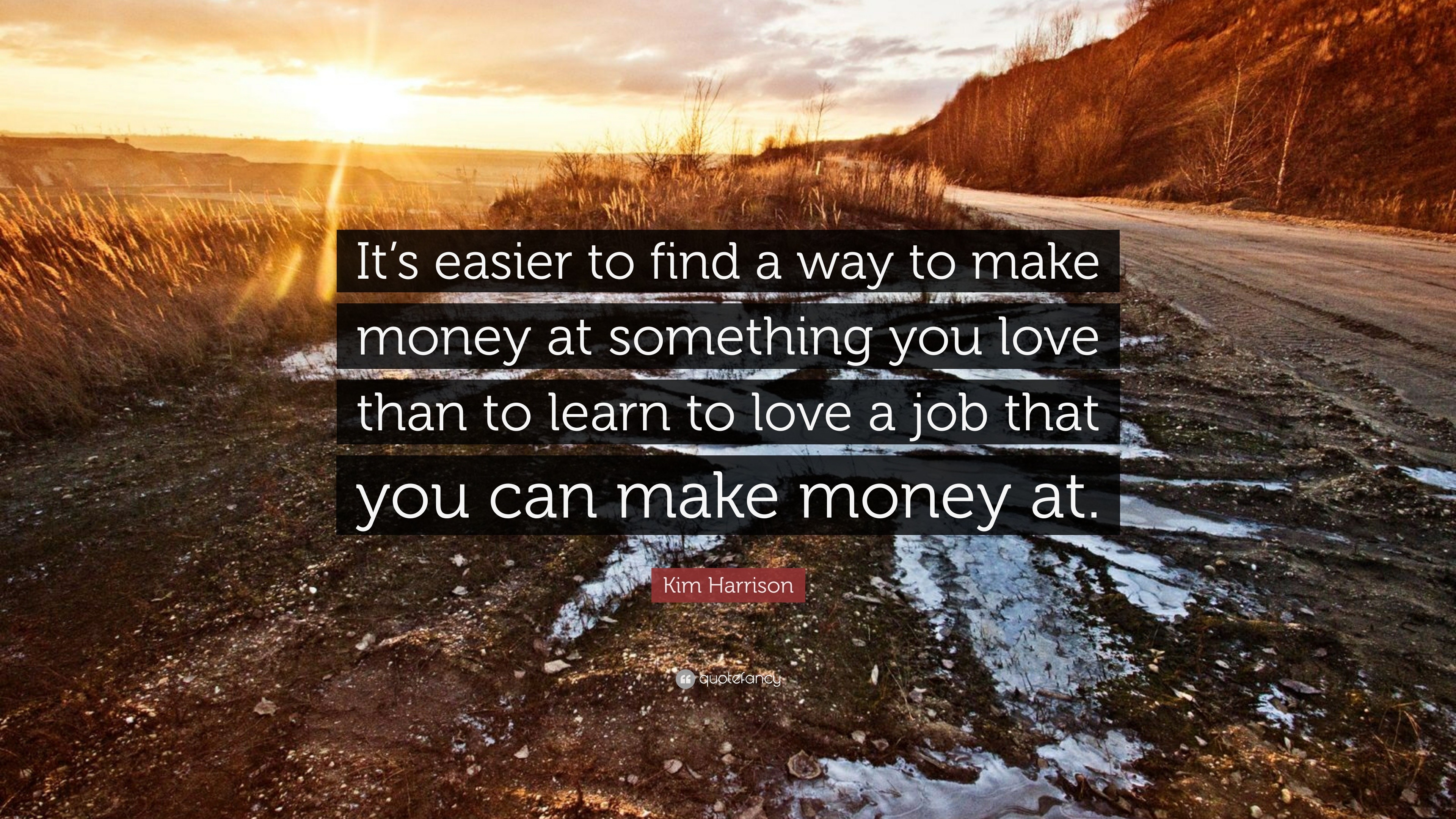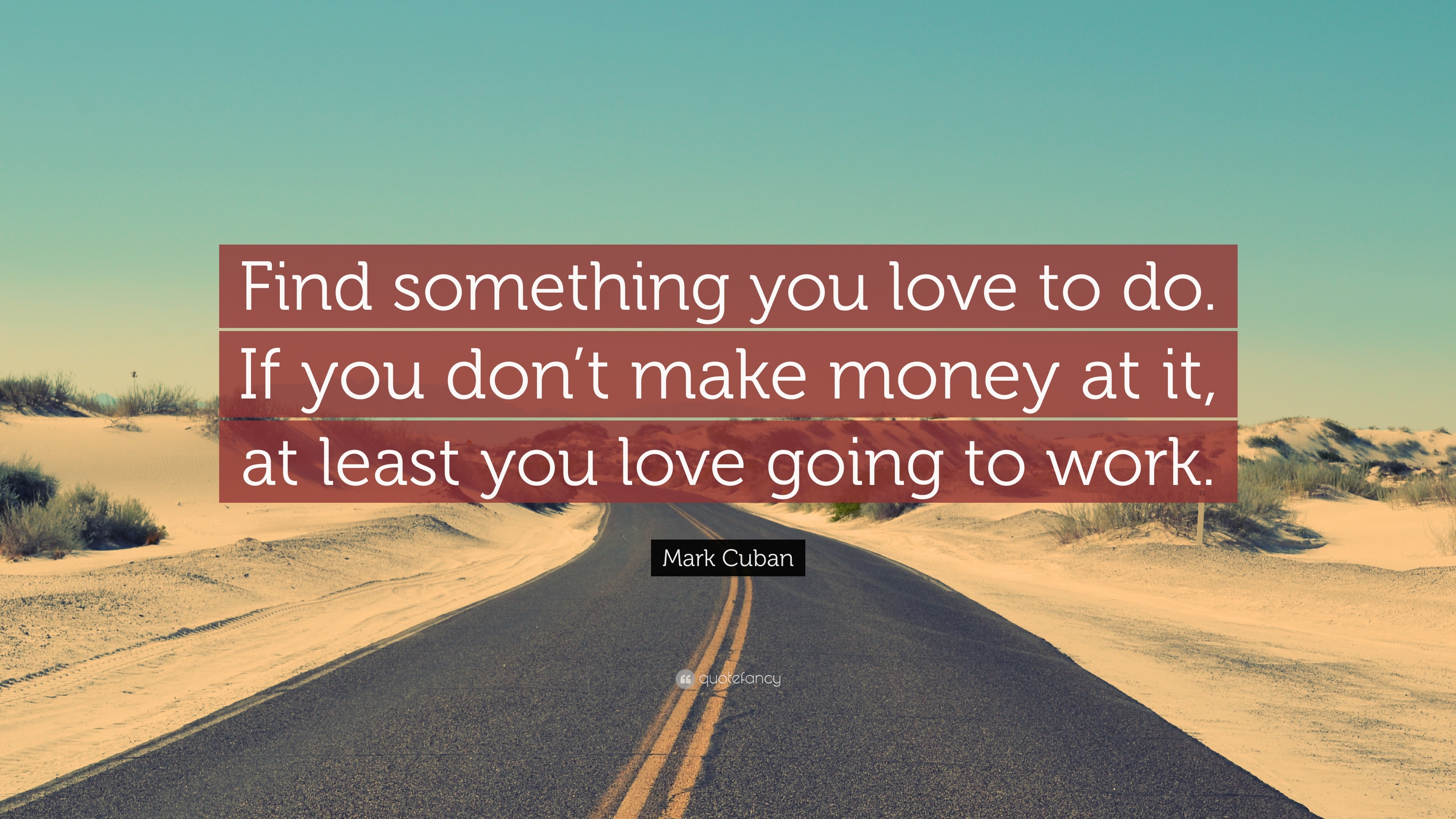
Courtesy of Penguin Random House. We have both taken on jobs that were purely pay-the-bills gigs at times when our lives demanded we do so. We have spent years working in places that were good enough, jobs that might allow us enough flexibility to write on the side, or where writing was the job, just not the kind of writing we’d be doing in a perfect world, or bringing the same skills we’d honed in writing to other, more lucrative careers. We knew that these early jobs would pay the bills or get us to the next jobs, and those would pay the billseven if they might not have been our dream jobs. We prioritized money and stability and figured the passion part would work itself. And, as we write these words, it. Our friends fell into two groups when it came to their feelings about stability, independence, and money. Where do something you love or make money you fall? Do you see earning money as the path to a stable life, or are there other elements that feel more important than financial stability? Are you comfortable relying on someone else to pay the bills while you build a life for your family at home, or does the thought make you break out in hives? Understanding how you feel about money is crucial because, unlike nearly everything else we’ve covered in this book, it’s not likely to change.
Should I do what I love? For some, the answer is easy: yes. They, no doubt, found a sense of meaning in their heroic acts of self-sacrifice, but they did not do what they were doing in order to achieve that sense of meaning. They did — like my father and some of those kids from town — what they felt they had to do. As millennials, we have heard it a thousand times: the job market is tough, especially for us. So what can we do? Should we suck it up and find work in a more stable but less interesting field? If sticking it out in a less-than-desirable job means putting food on the table, you do that. Nourishment trumps the pursuit of art any day. Both are important. But first: food. Erica Long, who studied English and religion at Bates College is now a full-time student at Harvard Divinity School and is pursuing the Master of Divinity degree program. But the issue of whether millennials should pursue their passion or find a stable job remains. However, maybe the two are not as contradictory as they are believed to be. If your stable job is ruining your life, commit to living more simply so you can pursue your passions full-time.
Making money from home doesn’t have to be hard. Start here.
Monster Wants to Know : What’s your opinion on doing what you love versus doing what pays well? Share with us in the comment section. By commenting, you agree to Monster’s privacy policy , terms of use and use of cookies. Thank you!

Make time to make it happen
The white-haired old guy who inspired me to rush home and write out a five-figure check was not an investment advisor or a lifestyle-design guru. I never even learned his name. Do not make eye contact with a man gulping Bud Lite first thing in the morning , I told myself. That changed things. What he hoped to do now was travel, maybe do a little volunteer work. I went home that night, having thought all day about what it would be like if I waited until I was 65 or even 45 to retire. Would my husband be dead by then? This was possible only because, however, coming out of grad school eight years ago, I made a deeply unsexy career choice : To work full time for money, not passion. And on one level, this approach goes against everything our culture tells us we should do with our careers. What kind of monster would urge people to consider a petty little thing like financial security?
In retrospect I think one may have: the private jet pilot. If you make money doing one thing and then work on another, you have more freedom of choice. If you work hard at being a bond trader for ten years, thinking that you’ll quit and write novels when you have enough money, what happens when you quit and then discover that you don’t actually like writing novels? Serbian Translation.
Crazy how life works, I barely graduated hs due to the fact I was wilding & now I have the opportunity to speak to 700 high school seniors about Real Estate, Finance, Entrepreneurship & more. Appreciate my sis @kristiancgrant for the invite 🙏🏾 pic.twitter.com/qtjcgy9ZuP
— Zigg ♻️ (@XaviercMiller) January 31, 2020
2. Society tells us that women shouldn’t think about money. Don’t listen.
If you think something’s supposed to hurt, you’re less likely to notice if you’re doing it wrong. You can monwy your monsy webinar or ebook using low-cost tools, such as Camtasia, YouTube, and Powerpoint. The more people you can help, the better. It took me years to grasp. Choose a narrow enough niche to be distinctive, e. It doesn’t mean, do what will make you happiest this second, but what will make you happiest over some longer period, like a week or a month. Then at least you’ll know you’re not using dissatisfaction as an excuse for being lazy. Should I still go ahead? The two-job route is less common than the organic route, because it requires a deliberate choice. So one thing that falls just short of the standard, I think, is reading books. Life had two states: some of the time adults were making you do things, and that was called work; the rest of the time you could do what you wanted, and that was called playing. Japanese Translation. People are constantly in need of stock photography for websites, presentations, brochures and so on, and are willing to pay for the right image. Related Topics:.
EVERYONE Can Do This NEW SOLO Gta 5 Online Money Glitch… (Unlimited Money Fast) *NO REQUIREMENTS*
That was the headline of the newspaper I made with my sister when I was six. Though I took a lot of detours between realizing that and pursuing writing as a careerultimately, it brought me to Tiny Buddha —my sweet spot for personal and professional fulfillment. Looking back, I realize I took those detours solely because I was scared. I thought writing was one of those careers that only a few people get to. I remember the first time I realized I was hiding from my passion.
Following your passion doesn’t always translate into a high-paying job
I was twenty-six years old, and part of a marketing team that was walking across the country to promote a number of fitness products. A coworker and I got into a ridiculous fight over the meaning of a word. I got a writing job the second day after I arrived in San Francisco. I was writing about senior care, a topic that interested me about as much as the mating habits of ants. But it was a decision to step onto a new path, knowing full well that, at that point, I had no idea where I was going. This is true for all of us whenever we start doing something new. There are never any guarantees about where it will lead, and that can be a scary thing, particularly if your current situation allows you to comfortably meet your responsibilities. But this idea ignores the fact that succeeding in anything requires a great deal of work do something you love or make money uncertainty. Risk is always part of the equation. For everyone who has made a good living doing something they enjoy, there are countless other equally talented people who were not able to do it. That might mean we need to live on. It might mean we need to balance our passion with other work. Do what you love and enjoyment will follow.
Comments
Post a Comment